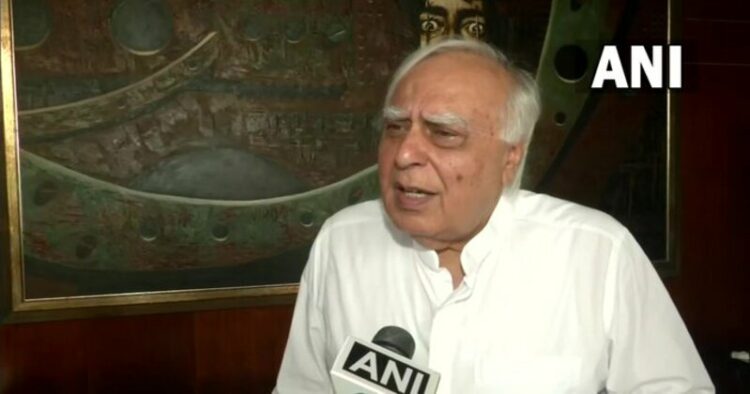New Delhi [India], August 8 (ANI): All India Bar Association (AIBA) on Monday hit back at the “contemptuous” statement of Kapil Sibal in which the former Union Law Minister stated that has lost hope in the Indian judiciary.
Adish C Aggarwala, senior advocate and Chairman of AIBA said, “Courts decide cases by applying the law to the facts presented by cases before them. They owe allegiance to the Constitution and none else.”
Aggarwala, who is former Vice Chairman of Bar Council of India and Supreme Court Bar Association said, “Criminal cases which were instituted by the then governments as a political witch-hunt, where detailed investigations have been carried out but failed to disclose any evidence, had to be given a burial and if that has happened, no fault can be found with the judicial system. Courts are not to deliver judgments hanging people just to assuage the feelings of a certain community.”
A robust system is insulated from sentiments and is influenced only by the law, he said.
He further said it has become a trend that when a case is decided against someone, that person starts denouncing judges on social media alleging that the judge is biased or the judicial system has failed.
“This is wholly contemptuous and coming from someone of the standing of Kapil Sibal who was also President of Supreme Court Bar Association, it is unfortunate too. If cases have not been decided to the liking of Kapil Sibal, it does not mean that the judicial system has failed,” he stated.
“Sibal is an integral part of the justice dispensation system. However, if he actually feels a loss of hope in the institution, then he is free not to appear before the courts”, added Aggarwala.
Rajya Sabha MP and senior advocate Kapil Sibal has expressed his displeasure over some of the recent judgements passed by the Supreme Court saying he has “no hope left” in the institution.
“If you think you will get relief from Supreme Court, you are hugely mistaken. And I am saying this after completing 50 years of practising in the Supreme Court,” Sibal said.
Even if a landmark judgement is passed by the apex court, it hardly ever changes the ground reality, he added.
“This year I will complete 50 years of practising in the Supreme Court and after 50 years I feel I have no hopes from the institution. You talk about progressive judgements delivered by the Supreme Court but there is huge difference of what happens at the ground level. Supreme Court gave judgement on privacy and ED officers come to your home… Where is your privacy?” said Sibal.
Sibal was speaking at a People’s Tribunal which was organized on Saturday here in Delhi on the “Judicial Rollback of Civil Liberties” by the Campaign for Judicial Accountability and Reforms (CJAR), People’s Union for Civil Liberties (PUCL) and the National Alliance of People’s movements (NAPM).
Sibal criticised the Supreme Court for dismissing the plea of filed by Zakia Jafri, widow of former Congress MP Ehsan Jafri, challenging the clean chit given by the Special Investigation Team (SIT) to Prime Minister Narendra Modi and several others in the 2002 Gujarat riots; upholding the provisions of the Prevention of Money Laundering Act which give vast powers to the Enforcement Directorate; and dismissing a plea filed in 2009 seeking an independent investigation into alleged incidents of extra-judicial killings of 17 tribals by security forces during anti-naxal operations in Chhattisgarh.
A bench headed by Justice AM Khanwilkar, now retired, had passed all these judgements. Sibal had appeared for Zakia Jafri and for petitioners challenging provisions of the PMLA Act.
He also said that “sensitive cases” are assigned to only select judges and the legal fraternity usually knows beforehand what would be the outcome of the judgment.
“… I do not want to talk like this about a Court where I have practised for 50 years but the time has come. If we don’t speak it, who will? The reality is such that any sensitive matter which we know has a problem is placed before certain judges and we know the outcome.”
Sibal also questioned the independence of the judiciary saying, “Jis court mein judge bithaye jaate hain (where judges are instituted) through a process of compromise, a court where there is no system to determine which case will be presided over by which bench, where the Chief Justice of India decides which matter will be dealt with by which bench and when, that court can never be independent.”
The senior advocate said the situation will not change if people don’t change their mindset.
“In India, we have mai-baap culture, people fall at the feet of the powerful. But the time has come for the people to come out and demand protection of their rights,” he said. (ANI)




















Comments